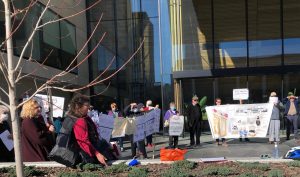Kathryn Kelly organised a demonstration outside the ACT Supreme Court attended by over 40 people. The attitude of court officials has hardened over the past few months. Protesters were told to move away from the doors as it was said they were “blocking the entrance”. The social distancing that was observed carefully ensured that there were plenty of spaces for the few people who approached the court doors to enter easily. A great deal of applause greeted Bernard Collaery on his arrival.
It was clear that the court would be open for anyone who wished to attend, so many of those present moved into the building. Security asked if we were the people at the demonstration and said that they would have to get advice about allowing us in. Protesters protested, and security was asked for written authorisation for keeping us out. Contact was made by the protesters with those in court and soon after, we were allowed to go through the security gates.
The courtroom, being very small, was full. Judge David Mossop made technical orders under National Security legislation that continued the operation of the Attorney-General’s certificate of non-disclosure. So everybody remains bound by that certificate of secrecy. The Judge provided his reasons to the parties in sealed envelopes. The defence retired to a private room to consider those reasons. The Attorney-General was given until 7th July to provide a marked-up copy of the reasons indicating the sections he wishes to be redacted.
The defence team then went outside to the waiting media and Christoper Flynn made this statement:
Statement regarding decision in s27 Hearing in R v Collaery
Canberra, Australian Capital Territory
26 June 2020
This hearing was all about whether Bernard Collaery will get an open trial – or a secret trial.
The Commonwealth asserts that it has never confirmed or denied whether there was an espionage operation in East Timor.
However, any trial of Mr Collaery requires the Commonwealth to confirm or deny the truth of what was publicly alleged by him in the media interviews for which he is being prosecuted.
It’s very disappointing that the trial will not be more open and that essential elements of the case will not be heard in public.
Open justice is an essential part of our legal system, the rights of defendants and our democracy.
This case should be heard in public. Highly regarded people with the highest levels of experience in foreign affairs and security agree.
The view that national security needs this trial to be secret is hotly contested, even in Canberra.
The court heard evidence in support of Mr Collaery from Gareth Evans, former foreign minister, Admiral Chris Barrie, former Chief of the Defence Forces, John McCarthy, former diplomat and ambassador to Indonesia and the US, and had evidence from Anthony Whealy, a former judge and expert in national security laws. Both Xanana Gusmao and Jose Ramos Horta gave affidavits supporting Mr Collaery.
Yet that strong evidence was not enough in the face of our restrictive laws that place a premium on secrecy over all other considerations.
Laws designed to protect Australians from terrorism, should not be used to close courts in this kind of case.
What a shame it would be for all Australians if laws that were meant to defend and protect us, ended up eroding the very things we mean to defend and protect.
We will be looking at bringing an appeal.
Christopher Flynn
Partner
Gilbert + Tobin Here is a pdf of this statement.
